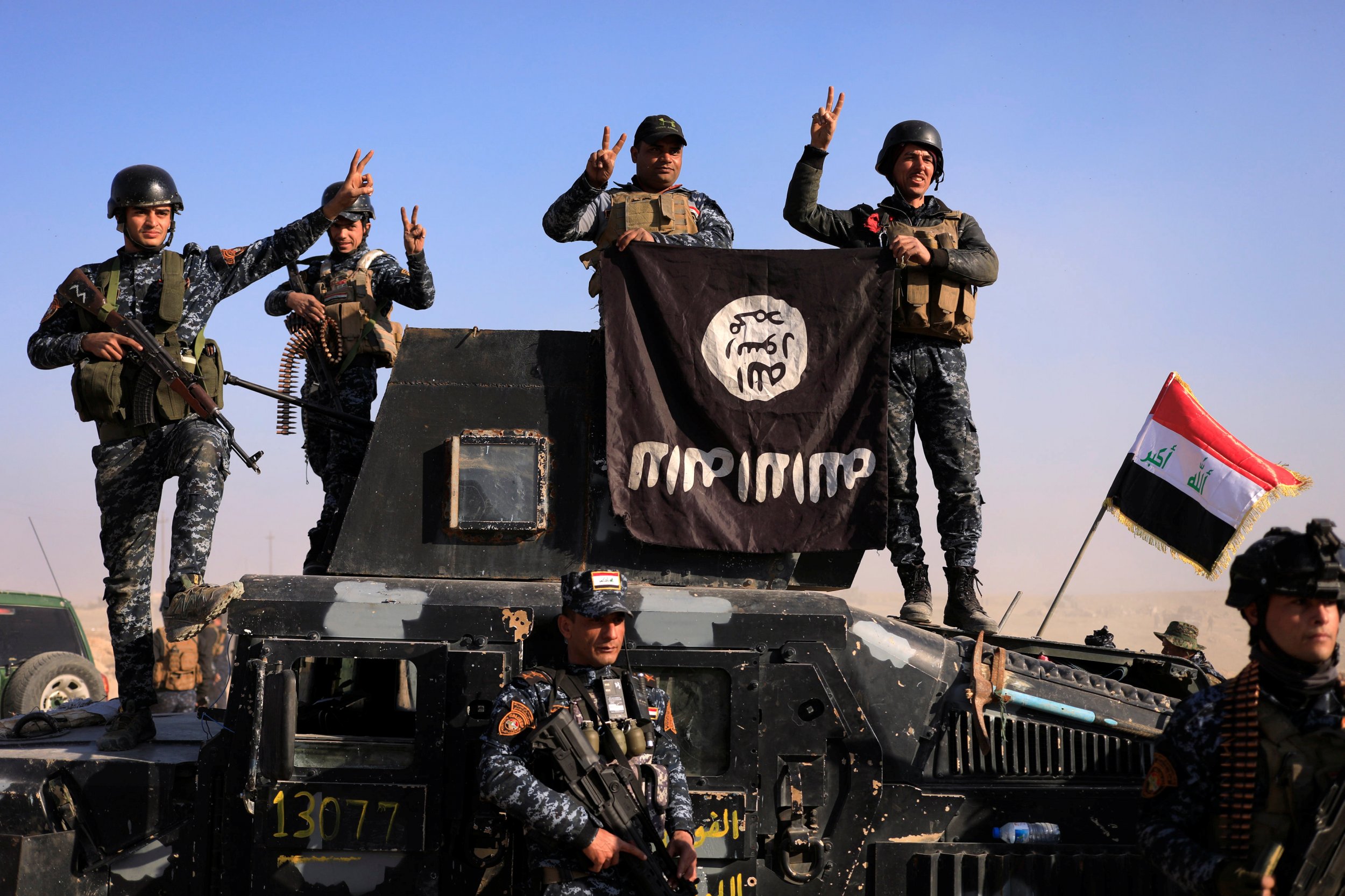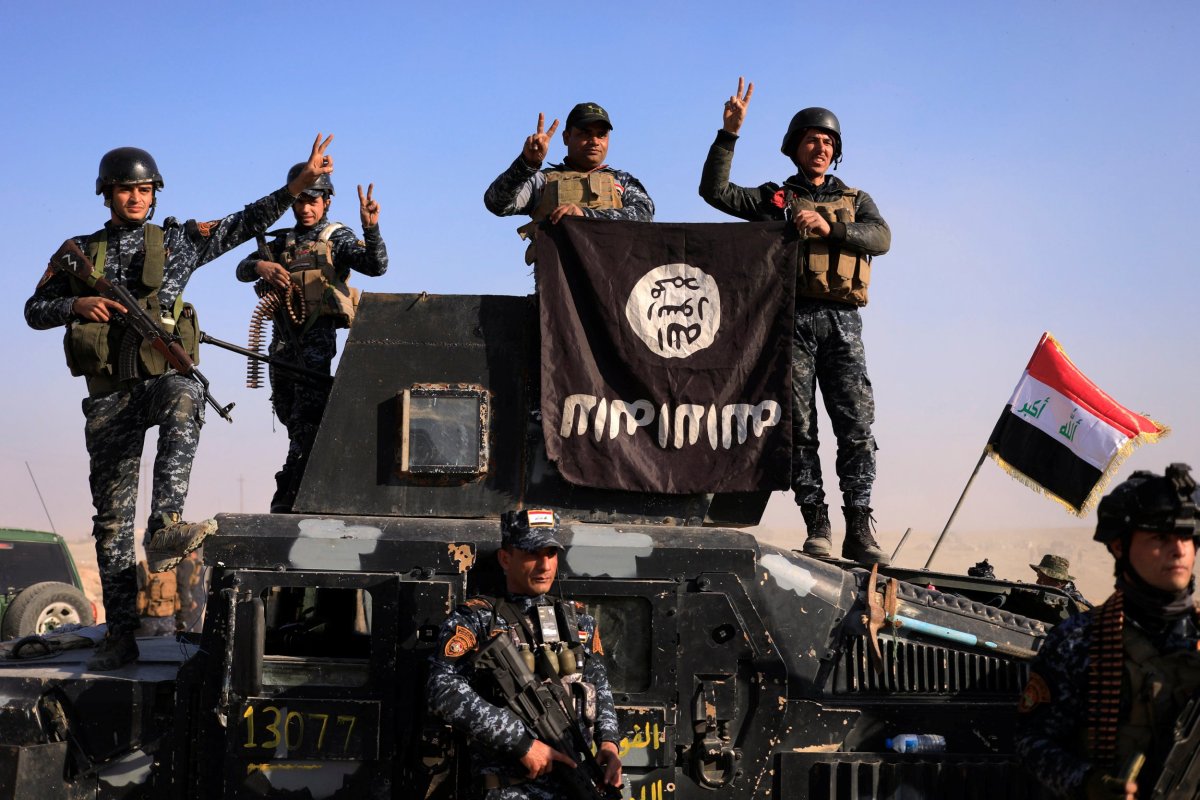
The final days of the Islamic State group may be nearer than ever. Nearly three years after the founding of its caliphate, ISIS faces almost total expulsion from Iraq and a formidable showdown with forces backed by the U.S. and Russia in its two remaining hubs of control in Syria.
In Iraq, ISIS is poised for defeat in the city of Mosul despite having its roots in the war-torn Middle Eastern nation. An alliance of the Iraqi military, Kurdish forces, Iran-backed Shiite Muslim militias and a U.S.-led coalition designed to defeat the group have pushed ISIS closer to the city's western outskirts, where surviving fighters will likely be forced into neighboring Syria.
ISIS, which began as Al-Qaeda's Iraqi franchise, controlled 40 percent of Iraq in 2014. After taking major cities in 2014, the jihadists faced consecutive defeats nationwide and by the end of March, they controlled less than seven percent of Iraq, according to Brigadier General Yahya Rasool, Iraqi spokesperson of the Joint Operations Command.
That means ISIS' territory in Iraq has largely been reduced to the city of Mosul, by far the largest population center under the group's control and the venue from which the group's leader, Abu Bakr al-Baghdadi, made his only known public appearance to call all Muslims to join his global jihadist network in 2014. But Iraqi troops and their allies have in recent months ousted ISIS militants from the eastern section of the city and pro-government forces were on the verge this week of retaking the al-Nuri mosque where Baghdadi made his iconic declaration, signifying another symbolic and strategic blow for ISIS.
Related: ISIS Militants Launch Multiple Chemical Weapons Attacks on Iraqi Troops

ISIS does have an exit plan for Iraq, however. While U.S. officials have estimated about 2,000 ISIS fighters remain in Mosul, numerous reports have emerged of members, including Baghdadi himself, fleeing to neighboring Syria, where the group's remaining 10,000 to 13,000 militants are believed to have gathered.
Across the border, ISIS' prospects are far less dim. The militant group still controls large portions of territory in central and eastern Syria, including the besieged city of Deir el-Zour, home to a bastion of Syrian government supporters.
But ISIS is being forced to face off various attacks from multiple factions in Syria, as well. After losing large swathes of the country to ISIS and opposition groups, the Syrian government has since reestablished control over virtually every major population center in Syria thanks a series of lightening offenses supported by Russian warplanes. In March, the Syrian army managed to oust ISIS from the historic city of Palmyra for the second time. While ISIS still controls significantstretches of central and eastern Syria, this land is sparsely populated and largely barren, making it difficult to hold without vital connections to resources and markets.
More recently, the Syrian Democratic Forces, a U.S.-backed, Kurd-dominated coalition of Arabs and ethnic minorities, has gained ground against ISIS in northern Syria. Its latest offensive involved taking back a number of villages in hamlets north of Raqqa, local Kurdish media reported Monday.
That campaign has coincided with efforts made by the Russia-backed Syrian military to relieve their embattled forces in Deir el-Zour nearly 90 miles away. Last month, the Syrian military and its allies battled their way toward Deir el-Zour from the south. Russian or Syrian warplanes launched more than 14 airstrikes Monday on ISIS positions in the city, according to local news outlet Deir Ezzour 24.
This two-front offensive could prove fatal for ISIS. The group will likely devote the bulk of its increasingly limited resources to surviving these conflicts, where they would not only be outnumbered by local ground forces, but outgunned by international airstrikes. If Raqqa, the head of the group's self-proclaimed caliphate, and Deir el-Zour, where Syria's oil fields are located, should fall out of the jihadists' hands, the group's future would be extremely uncertain.
Aside from dismantling the closest thing to a central government ISIS has managed to establish, the loss of Raqqa would be especially devastating because it would tarnish an apocalyptic promise that has formed a core tenet of ISIS' ideology. The group claims Raqqa is the place where the jihadists will face off with the "Roman," or Western, armies and come out victorious, an event that would ultimately usher in the end of times. Defeat, therefore, could hurt ISIS' credibility among its existing or future recruits.
Just prior to the beginning of the Iraqi-led campaign against ISIS in Mosul last year, London-based security analyst Firas Abi Ali told BBC's World Service that he predicted an ISIS defeat by "late 2017." As time goes on, this forecast seems more and more likely.
Uncommon Knowledge
Newsweek is committed to challenging conventional wisdom and finding connections in the search for common ground.
Newsweek is committed to challenging conventional wisdom and finding connections in the search for common ground.
About the writer
Based in his hometown of Staten Island, New York City, Tom O'Connor is an award-winning Senior Writer of Foreign Policy ... Read more
To read how Newsweek uses AI as a newsroom tool, Click here.








